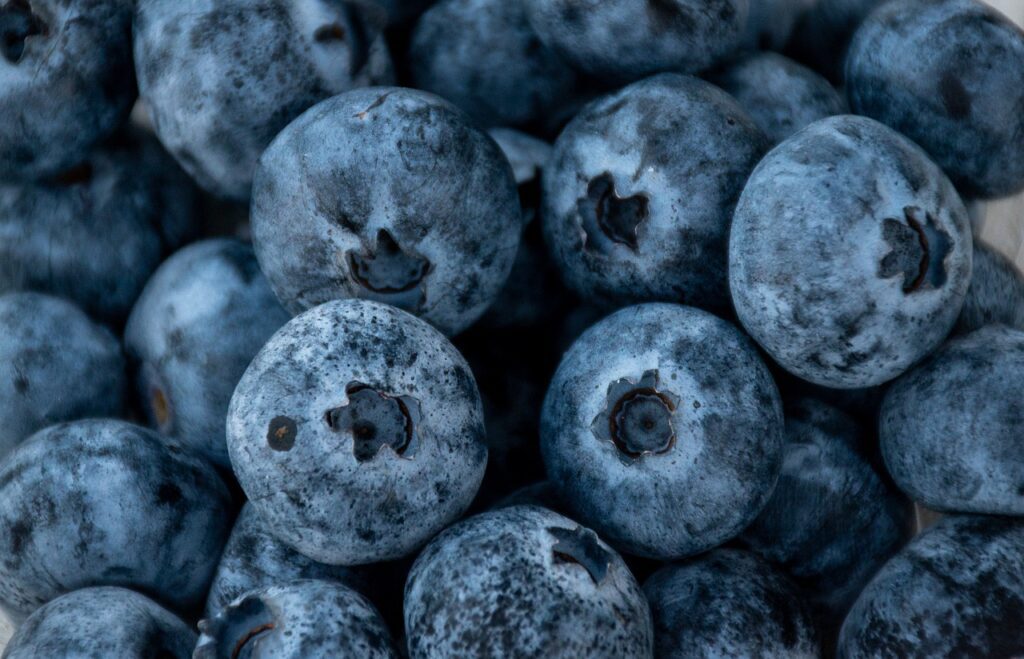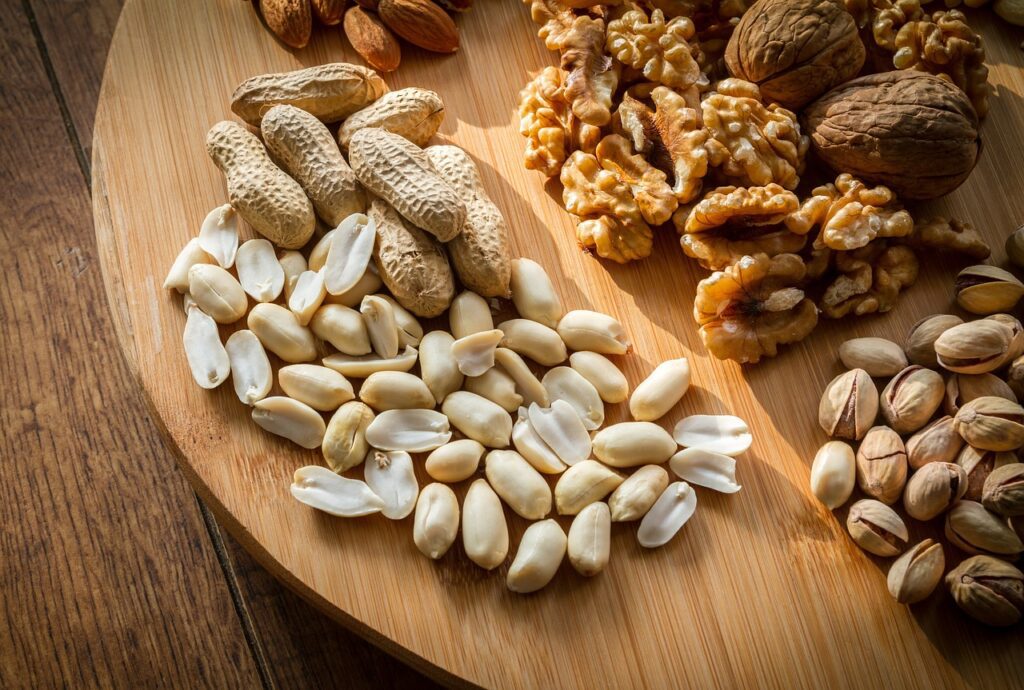

Are you looking to boost your brainpower and mental wellbeing? Discover the power of nutrition with our top 6 recommendations for the best snacks for brain function. These carefully selected snacks not only tantalize your taste buds but also provide essential nutrients to enhance cognitive abilities and support overall mental health. From nuts rich in omega-3s to fruits packed with antioxidants, each snack is a step towards a sharper, healthier mind. Dive into our guide to find the perfect brain-boosting snacks for your daily routine!
Table of Contents
Blueberries


Delving into the secrets of blueberries, these tiny, antioxidant-rich fruits work wonders in protecting our brain cells from free radical damage. This neuroprotective magic contributes significantly to improved cognition and memory.
Essential for a brain-boosting diet, blueberries are known to delay brain aging. Frequent consumption can enhance brain health, promoting availability and accessibility of essential nutrients for optimal brain function.
Antioxidant-rich fruit
Blueberries, a potent source of antioxidants, provide numerous brain health benefits. These small yet powerful fruits can enhance cognitive function, reduce the risk of neurodegenerative diseases, and bolster overall brain health.
- Eating fresh or frozen blueberries can improve memory and delay brain aging.
- Blueberries contain flavonoids, which boost brain connections and improve cell survival.
- Blueberries have anthocyanins that can decrease inflammation and oxidative stress.
- The antioxidants found in blueberries can help protect the brain from free radical damage.
Benefits for brain health
Consuming blueberries has a myriad of benefits for brain health, including memory enhancement. Regular intake supports chronic brain health, contributing significantly to mental well-being.
- Regular consumption of blueberries provides antioxidants, which fight oxidative stress and inflammation linked to brain aging and neurodegenerative diseases.
- Blueberries contain flavonoids that improve memory and delay brain aging.
- They are rich in anthocyanins which reduce neuroinflammation, improve brain signaling, and facilitate the growth of neurons.
- The consumption of blueberries has been linked to improved short-term memory and prolonged mental acuity.
Dark Chocolate


Dark chocolate, a decadent delight, works wonders to the brain. It’s loaded with flavonoids that aid in enhancing memory and cognitive function.
Join the dark side and savor the benefits it offers. Regular indulgence in dark chocolate can boost cognitive health, making it an irresistible path to improved brain function.
Rich in flavonoids
Dark chocolate, renowned for its richness in flavonoids, plays an integral role in brain health and mental acuity. A myriad of scientific research demonstrates how it aids in the enhancement of cognitive functions.
- Flavonoids in dark chocolate improve memory, cognitive performance and flexibility.
- These vital compounds stimulate blood flow to the brain, resulting in updated and improved brain functions.
- The flavonoids in dark chocolate have potential protective effects against neurodegenerative diseases.
- Dark chocolate loaded with flavonoids can stimulate neuronal survival, growth, and plasticity.
Enhances cognitive function
A balanced dietary regimen incorporating the right snacks, rich in specific nutrients, can have significant effects on enhancing one’s cognitive abilities. Foods like dark chocolate, especially those high in flavonoids and antioxidants, have been shown to significantly improve various aspects of brain functions. Let’s delve into these foods particularly beneficial for cognitive function.
Nuts and Seeds


When aiming to improve brain functionality, you can’t overlook the powerhouse duo, nuts and seeds. Abundant in Omega-3 fatty acids, these small snacks pack a big punch in terms of cognitive health enhancement. Vitamin E, another critical nutrient found in nuts and seeds, offers added brain health benefits.
These crunchy bites should not be underestimated. Their significant brain-boosting attributes are due to the mix of essential fatty acids and vitamins. Regular consumption of these healthful snacks can provide support for mental wellbeing, contributing to improved memory and sharper focus.
Omega-3 fatty acids for brain health
While popularly known for their heart-health benefits, Omega-3 fatty acids found in nuts and seeds are equally essential for optimal brain function. They’re crucial in creating cell membranes around brain cells and improving neuron communication and flexibility.
The role Omega-3 fatty acids play in maintaining brain health should not be underestimated. Consumption of foods rich in these beneficial fats, like nuts and seeds, can reduce age-related cognitive decline and potentially prevent brain-related disorders.
To unlock the power of Omega-3 fatty acids for your brain health, incorporate a variety of nuts and seeds into your diet. A handful of walnuts, flax seeds, or chia seeds daily will enhance your mental wellbeing, contributing to better focus and memory.
Rich in Vitamin E
Vitamin E, a fat-soluble nutrient, offers impressive health benefits including bolstering brain function. It acts against oxidative stress that contributes to brain aging, and heightens the protective barriers of neurons.
Moreover, this essential vitamin maintains cognitive abilities as we age, specifically functions like memory, problem-solving, and attention span. Vitamin E deficiency has been associated with neurological problems and cognition impairment.
Nuts, particularly almonds and hazelnuts, as well as seeds like sunflower seeds, pack a potent punch of Vitamin E. Regular consumption of these nutrient-rich snacks supports enhanced cognitive health.
Sunflower seeds not only have a high Vitamin E content, but also a broad profile of other essential nutrients beneficial to brain health like Omega-3 fatty acids. Incorporating these into your diet can greatly assist in boosting brain function.
Avocados


Known for their creamy texture and rich flavor, avocados are not only a favorite for many people but also pack substantial brain-boosting nutrients. These superfruits contain healthy monounsaturated fats that are known to improve blood flow to the brain, thus supporting better cognitive function.
Avocados present a nutrient-dense snack choice for health-conscious individuals on a quest for enhanced brain function. The consumption of this versatile fruit can aid focus and memory while providing overall support to your mental wellbeing due to its rich content of essential fatty acids.
Healthy monounsaturated fats
Avocados, rich in healthy monounsaturated fats, are an underappreciated ally for brain health. These fats contribute to maintaining the structural integrity of brain cells crucial for healthy cognitive functions.
The healthy fats found in avocados facilitate optimal blood flow, thereby promoting brain health. They help maintain arterial health, a vital aspect considering the brain is an organ highly dependent on a steady blood flow.
Furthermore, studies have shown that monounsaturated fats play a significant role in enhancing memory and other neural functions. It is noted that regular consumption of foods high in these fats, like avocados, reveals a beneficial impact on overall brain performance.
Improves blood flow to the brain
Avocados, heralded for their high content of healthful monounsaturated fats, play an essential part in increasing brain blood flow. Adequate circulation is key to delivering necessary nutrients to the brain, optimizing its performance.
Increasing blood flow to the brain not only aids in nutrient delivery but also effectively boosts cognitive abilities. This enhanced cognition is observed as improved memory, higher problem-solving skills, and increased creativity.
Our brain thrives when receiving nutrient-enriched blood, a state optimally achieved by consistently nourishing our bodies with brain-supportive foods like avocados. This is a simple, yet powerful, method to enhance everyday mental tasks and long-term brain health.
Leafy Green Vegetables


Loaded with antioxidants and essential vitamins, leafy green vegetables serve as a powerful asset for nourishing the brain. Consuming them regularly spawns numerous benefits, including bolstered concentration, improved memory, and enhanced overall mental performance.
Incorporating leafy greens into your diet not only promotes physical health, but they are critical for your cognitive wellbeing too. The nutrients found in these vegetables help slow down cognitive decline, ensuring your brain stays healthy and active for longer.
High in antioxidants and vitamins
Rich in antioxidants and laden with essential vitamins, leafy green vegetables are a powerhouse for maintaining and improving brain health. Consuming them regularly provides the nutrients necessary for optimal cognitive function.
Antioxidants present in these greens support the reduction of oxidative stress on brain cells, offering significant neuroprotective benefits. This, then, also assists in enhancing concentration and memory.
The vitamin content in leafy greens, particularly Vitamin K, folate, and beta carotene, contributes significantly to brain health. They have been found to delay cognitive decline and improve overall brain function.
Various studies have revealed an association between a diet high in leafy green vegetables and preserved cognitive function. Indeed, having them regularly can keep your brain young and healthy.
To conclude, incorporating leafy green vegetables in your diet can serve as a preventive measure against cognitive decline. Their high antioxidant and vitamin content supports brain health and plays a vital role in cognitive improvement.
Reduces cognitive decline
Leafy green vegetables are not just a mere addition to a dish but a significant part of our cognitive defense system. Rich in antioxidants and vitamins, these compounds work in concert, providing a natural defense against cognitive decline.
Science supports the crucial role of leafy green vegetables in slowing cognitive decline. We owe this primarily to the high antioxidant content, which fends off free radicals known to accelerate mental degradation.
These superfoods potentiate a sturdy protection for brain health. A consistent diet of greens can remarkably slow the process of cognitive decline, preserving your mental health
You can easily incorporate leafy greens into your meals. From salads to smoothies, these vegetables enhance not just the flavor but significantly, the nutritive value contributing to better brain health.
Consider a daily dose of leafy green vegetables as a means to shore up your mental defenses. Including greens in your everyday diet undeniably holds the promise of preserving your cognitive health.
Turmeric


Turmeric, often considered a simple kitchen spice, unveils its wide array of cognitive benefits upon closer scrutiny. Its potent anti-inflammatory properties help keep the brain healthy and active.
Deemed the golden spice, turmeric stands as a strong player in promoting brain health. It enhances the Brain-Derived Neurotrophic Factor (BDNF), a crucial element in brain development and function.
Powerful anti-inflammatory properties
Of immense value in the health sphere, turmeric is renowned for its potent anti-inflammatory constituents. This vibrantly hued spice boasts curcumin, well-known for its ability to defend the brain against inflammation – an often overlooked factor in cognitive decline.
Your brain’s health significantly benefits from turmeric’s anti-inflammatory properties. By reducing brain inflammation, turmeric can play a role in lessening symptoms of depression and Alzheimer’s disease.
Take every advantage in guarding your brain health. Adding turmeric to your diet functions as a shield against neurodegenerative diseases, thanks to the anti-inflammatory impact of curcumin.
Enhances brain-derived neurotrophic factor (BDNF)
Harnessing the power of turmeric could significantly influence cognitive function via its ability to enhance Brain-Derived Neurotrophic Factor (BDNF). A diet supplemented with this potent anti-inflammatory spice can help our brains adapt to new information and experiences by encouraging neuron development and strengthening neuronal connections.
Rich in curcumin, one of the active compounds in turmeric, this spice has a unique ability to cross the blood-brain barrier. It reaches the brain’s direct environment where it can boost levels of BDNF, a type of growth hormone that aids brain function.
Several compelling research studies underscore turmeric’s role in enhancing BDNF. These studies indicate a clear link between the consumption of turmeric and improved brain function, suggesting that including turmeric in our diets could effectively protect our long-term brain health.
Improving BDNF levels appears to be an effective strategy for protecting cognitive functions and may prevent debilitating conditions like Alzheimer’s Disease. Turmeric, with its scientifically backed reactive compound curcumin, undoubtedly asserts itself as a powerful resource to fortify brain health.
Nuts and Seeds
When aiming to improve brain functionality, you can’t overlook the powerhouse duo, nuts and seeds. Abundant in Omega-3 fatty acids, these small snacks pack a big punch in terms of cognitive health enhancement. Vitamin E, another critical nutrient found in nuts and seeds, offers added brain health benefits.
These crunchy bites should not be underestimated. Their significant brain-boosting attributes are due to the mix of essential fatty acids and vitamins. Regular consumption of these healthful snacks can provide support for mental wellbeing, contributing to improved memory and sharper focus.
Omega-3 fatty acids for brain health
While popularly known for their heart-health benefits, Omega-3 fatty acids found in nuts and seeds are equally essential for optimal brain function. They’re crucial in creating cell membranes around brain cells and improving neuron communication and flexibility.
The role Omega-3 fatty acids play in maintaining brain health should not be underestimated. Consumption of foods rich in these beneficial fats, like nuts and seeds, can reduce age-related cognitive decline and potentially prevent brain-related disorders.
To unlock the power of Omega-3 fatty acids for your brain health, incorporate a variety of nuts and seeds into your diet. A handful of walnuts, flax seeds, or chia seeds daily will enhance your mental wellbeing, contributing to better focus and memory.
Rich in Vitamin E
Vitamin E, a fat-soluble nutrient, offers impressive health benefits including bolstering brain function. It acts against oxidative stress that contributes to brain aging, and heightens the protective barriers of neurons.
Moreover, this essential vitamin maintains cognitive abilities as we age, specifically functions like memory, problem-solving, and attention span. Vitamin E deficiency has been associated with neurological problems and cognition impairment.
Nuts, particularly almonds and hazelnuts, as well as seeds like sunflower seeds, pack a potent punch of Vitamin E. Regular consumption of these nutrient-rich snacks supports enhanced cognitive health.
Sunflower seeds not only have a high Vitamin E content, but also a broad profile of other essential nutrients beneficial to brain health like Omega-3 fatty acids. Incorporating these into your diet can greatly assist in boosting brain function.


Avocados
Known for their creamy texture and rich flavor, avocados are not only a favorite for many people but also pack substantial brain-boosting nutrients. These superfruits contain healthy monounsaturated fats that are known to improve blood flow to the brain, thus supporting better cognitive function.
Avocados present a nutrient-dense snack choice for health-conscious individuals on a quest for enhanced brain function. The consumption of this versatile fruit can aid focus and memory while providing overall support to your mental wellbeing due to its rich content of essential fatty acids.
Healthy monounsaturated fats
Avocados, rich in healthy monounsaturated fats, are an underappreciated ally for brain health. These fats contribute to maintaining the structural integrity of brain cells crucial for healthy cognitive functions.
The healthy fats found in avocados facilitate optimal blood flow, thereby promoting brain health. They help maintain arterial health, a vital aspect considering the brain is an organ highly dependent on a steady blood flow.
Furthermore, studies have shown that monounsaturated fats play a significant role in enhancing memory and other neural functions. It is noted that regular consumption of foods high in these fats, like avocados, reveals a beneficial impact on overall brain performance.
Improves blood flow to the brain
Avocados, heralded for their high content of healthful monounsaturated fats, play an essential part in increasing brain blood flow. Adequate circulation is key to delivering necessary nutrients to the brain, optimizing its performance.
Increasing blood flow to the brain not only aids in nutrient delivery but also effectively boosts cognitive abilities. This enhanced cognition is observed as improved memory, higher problem-solving skills, and increased creativity.
Our brain thrives when receiving nutrient-enriched blood, a state optimally achieved by consistently nourishing our bodies with brain-supportive foods like avocados. This is a simple, yet powerful, method to enhance everyday mental tasks and long-term brain health.


Leafy Green Vegetables
Loaded with antioxidants and essential vitamins, leafy green vegetables serve as a powerful asset for nourishing the brain. Consuming them regularly spawns numerous benefits, including bolstered concentration, improved memory, and enhanced overall mental performance.
Incorporating leafy greens into your diet not only promotes physical health, but they are critical for your cognitive wellbeing too. The nutrients found in these vegetables help slow down cognitive decline, ensuring your brain stays healthy and active for longer.
High in antioxidants and vitamins
Rich in antioxidants and laden with essential vitamins, leafy green vegetables are a powerhouse for maintaining and improving brain health. Consuming them regularly provides the nutrients necessary for optimal cognitive function.
Antioxidants present in these greens support the reduction of oxidative stress on brain cells, offering significant neuroprotective benefits. This, then, also assists in enhancing concentration and memory.
The vitamin content in leafy greens, particularly Vitamin K, folate, and beta carotene, contributes significantly to brain health. They have been found to delay cognitive decline and improve overall brain function.
Various studies have revealed an association between a diet high in leafy green vegetables and preserved cognitive function. Indeed, having them regularly can keep your brain young and healthy.
To conclude, incorporating leafy green vegetables in your diet can serve as a preventive measure against cognitive decline. Their high antioxidant and vitamin content supports brain health and plays a vital role in cognitive improvement.
Reduces cognitive decline
Leafy green vegetables are not just a mere addition to a dish but a significant part of our cognitive defense system. Rich in antioxidants and vitamins, these compounds work in concert, providing a natural defense against cognitive decline.
Science supports the crucial role of leafy green vegetables in slowing cognitive decline. We owe this primarily to the high antioxidant content, which fends off free radicals known to accelerate mental degradation.
These superfoods potentiate a sturdy protection for brain health. A consistent diet of greens can remarkably slow the process of cognitive decline, preserving your mental health
You can easily incorporate leafy greens into your meals. From salads to smoothies, these vegetables enhance not just the flavor but significantly, the nutritive value contributing to better brain health.
Consider a daily dose of leafy green vegetables as a means to shore up your mental defenses. Including greens in your everyday diet undeniably holds the promise of preserving your cognitive health.


Turmeric
Turmeric, often considered a simple kitchen spice, unveils its wide array of cognitive benefits upon closer scrutiny. Its potent anti-inflammatory properties help keep the brain healthy and active.
Deemed the golden spice, turmeric stands as a strong player in promoting brain health. It enhances the Brain-Derived Neurotrophic Factor (BDNF), a crucial element in brain development and function.
Powerful anti-inflammatory properties
Of immense value in the health sphere, turmeric is renowned for its potent anti-inflammatory constituents. This vibrantly hued spice boasts curcumin, well-known for its ability to defend the brain against inflammation – an often overlooked factor in cognitive decline.
Your brain’s health significantly benefits from turmeric’s anti-inflammatory properties. By reducing brain inflammation, turmeric can play a role in lessening symptoms of depression and Alzheimer’s disease.
Take every advantage in guarding your brain health. Adding turmeric to your diet functions as a shield against neurodegenerative diseases, thanks to the anti-inflammatory impact of curcumin.
Enhances brain-derived neurotrophic factor (BDNF)
Harnessing the power of turmeric could significantly influence cognitive function via its ability to enhance Brain-Derived Neurotrophic Factor (BDNF). A diet supplemented with this potent anti-inflammatory spice can help our brains adapt to new information and experiences by encouraging neuron development and strengthening neuronal connections.
Rich in curcumin, one of the active compounds in turmeric, this spice has a unique ability to cross the blood-brain barrier. It reaches the brain’s direct environment where it can boost levels of BDNF, a type of growth hormone that aids brain function.
Several compelling research studies underscore turmeric’s role in enhancing BDNF. These studies indicate a clear link between the consumption of turmeric and improved brain function, suggesting that including turmeric in our diets could effectively protect our long-term brain health.
Improving BDNF levels appears to be an effective strategy for protecting cognitive functions and may prevent debilitating conditions like Alzheimer’s Disease. Turmeric, with its scientifically backed reactive compound curcumin, undoubtedly asserts itself as a powerful resource to fortify brain health.


